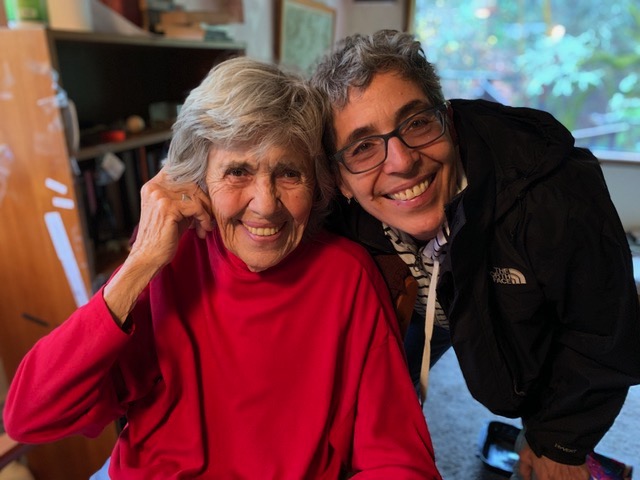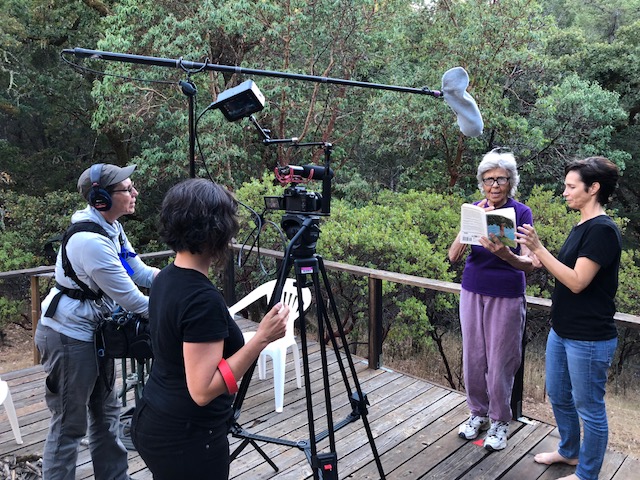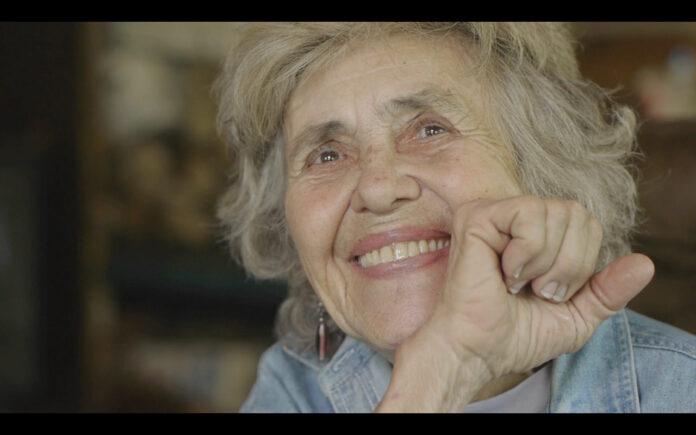“I don’t think there are any other films with animated flying psychic lesbians,” filmmaker Deborah Craig told me over Zoom. “We really couldn’t pass it up.”
Craig was speaking about Sally, the film she’s working on, along with coproducer Jörg Fockele and coproducer-editor Ondine Rarey, that chronicles the rambunctious, curious, and inspiring life of unsung radical lesbian hero Sally Gearhart, who is entering her ninth decade. (A Kickstarter campaign to finish the film ends Tue/6; an online birthday party for Gearhart takes place Sun/2.)
The flying lesbians in question are to illustrate Gearhart’s groundbreaking, 1978 speculative fiction novel The Wanderground, a classic of radical feminist separatist literature, in which a group of women flee from male-dominated cities to the forest to live in harmony with the natural world. Also, they have superpowers.
Rediscovering radical lesbian sci-fi is all the rage right now (witness Octavia Butler’s recent climb up the New York Times bestseller list 15 years after her passing), but penning an archetypal vision of queer ecofeminist utopia, and several follow-ups, is just one of the many milestones in an outspoken, intellectual, irascible life marked by both iconic activism and puzzling retreat.
While renowned as a stirring feminist writer-speaker and separatism proponent—eventually establishing her own utopian space in the wilds near Willits, California—she was by no means a stranger to working side-by-side with gay men in the liberation movement, including Harvey Milk during his final years. As a professor at San Francisco State University, Gearhart helped develop one of the first women and gender studies programs in the United States. Those are just some of the accomplishments covered in Sally, which also showcases a fiercely independent yet infectious personality.
The film is in the middle of production, moving ahead despite COVID interruption, with several more interviews slated, Craig told me. “We started out with a bit of a leg up, because my previous film was a short documentary called A Great Ride, that featured Sally. In that film, she’s one of the lesbian characters navigating the aging process. She was just such an incredible personality with this obviously rich history. After that film, Jörg, Ondine, and I put our heads together and said, we really have to continue this and focus on Sally.
“This new film follows the whole arc of her life. She came to San Francisco in the 1970s from Texas, and we’re going back to really explore where she came from, all her accomplishments, and what’s going on with her now. It’s really a fascinating trajectory,” Craig said. “The things she’s done have been so important. She’s this brilliant, smart, funny, charismatic person. And we’re here now and she’s almost 90.
“We need to do this while we still have her with us, so she gets the recognition she deserves and people get to know her,” Craig said.

Gearheart was intrinsic to the fight, alongside Harvey Milk, to defeat the 1978 Briggs Initiative, the California ballot proposition that would have banned gay teachers from schools, famously debating rabidly homophobic initiative sponsor John Briggs himself on television. Gearheart handed Briggs’ ass to him, but she and other women activists of the time, like Black lesbian leader Gwenn Craig, appear to be disappearing from the history.
“Sally was right there with Harvey especially during the last year of his life,’ Fockele, who was also on the Zoom call, said. “One of his biggest successes was beating the Briggs initiative and it would never have happened without Sally. Yet in the movie Milk, she’s nowhere to be found. They shot the whole famous KQED debate segment with Briggs, and everyone was there except Sally. Yet in reality she was the one who was front and center, keeping her calm, talking about religion being funny and charming. They did the same with Gwenn Craig, who was also part of the struggle. She’s nowhere in the movie.”
The question of why Gearhart has been generally passed over in the lore of the gay liberation struggle—beyond the narrative limitations and systemic sexism inherent in writing a Hollywood entertainment—”is something that has no easy answers,” Craig said. “Obviously, Milk is just one of the many, many examples of the erasure of women, just like the erasure of people of color and and queer people. It’s essential that the narrative be corrected.
“But in Sally’s case, the more you learn about the issue, the more complex it is—and that’s true about her in every aspect. She was an adamant separatist who loved men, who had male friends and even Republican friends. Separatism has a very complicated history that many people shy away from. And she left town. She had started her own refuge with no electricity, no heat, growing food and living with other women, and when she retired at 60 she moved up there full-time.
“She removed herself from the center of gravity of the gay rights movement and academia to go live in the woods and write fantasy novels and basically say, ‘Fuck it all.’ Now she’s still up there, with people checking in on her, completely living alone, the last one on the land. That’s how we got to know her, for the first film about aging. I called her up and said, ‘I heard you’re in your 80s and cutting your own firewood with a chainsaw, can I see that?’ and then we found out who she was.”

Gearhart, a feisty personality who apparently loves to flirt with any woman in front of or behind the camera, was totally fine with opening up about her life. She especially appreciated that Craig is working with almost all women on the film. “It was important to me that my crew is women, especially in the context of what Sally was fighting for,” Craig said. “She felt comfortable.”
Fockele said, “Right now it seems the only reference we have to that older generation of activists is through movies. Something I’ve experienced, especially around HIV, is that younger generations of queer folks see AIDS as this far away memory, and I feel it’s the same way with queer pioneers, including Sally. Deborah and I are right on the brink of a generation who may have heard of Sally, and there are older people, especially women activists and feminists, who know her. But the most powerful way remember her and present her to younger generations is through film.
“You can look at something like Milk which is important to the activists of the time who were in it, and also so vital to teaching young people who Harvey was. We want to record the actual history and people behind these events before they fade away.”
(Fockele is definitely right about the importance of film in remembering queer heroes—my own first encounter with Gearhart was a PBS rebroadcast in the 1990s of filmmaker Peter Adair’s 1977 Word Is Out: Stories of Some of Our Lives, in which Gearheart, then a women’s studies professor at San Francisco State, giving a fiery speech that made a lasting impression on my tiny gay brain.)
The story of Sally Gearheart as lesbian activist also holds personal resonance for Craig, a longtime filmmaker who specializes in queer stories. “I came out as a lesbian in my teens,” she told me. “I was not a separatist, I was very immersed in the worlds of music and photography, which was a very male world. I never really understood separatism. I’m 30 years younger than Sally, so that wasn’t really my world.
“But getting to know Sally has helped me understand the purpose of separatism, and its historical perspective. Although I knew her name, in the beginning I didn’t know who she really was, how important and multi-faceted her personality and accomplishments were,” Craig said.
“So this has been a process of discovery for me, following her life through all these movements and stages that have so much significance to LGBT history. It’s been about digging into my own queer roots and realizing that Sally’s work in a way gave me the luxury of not having to care about separatism as I was growing up as a lesbian.”
Find out more about the Sally movie Kickstarter campaign here, and Sally’s Sun/2 online birthday party here.







